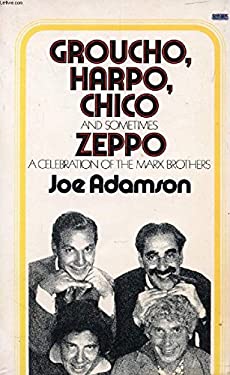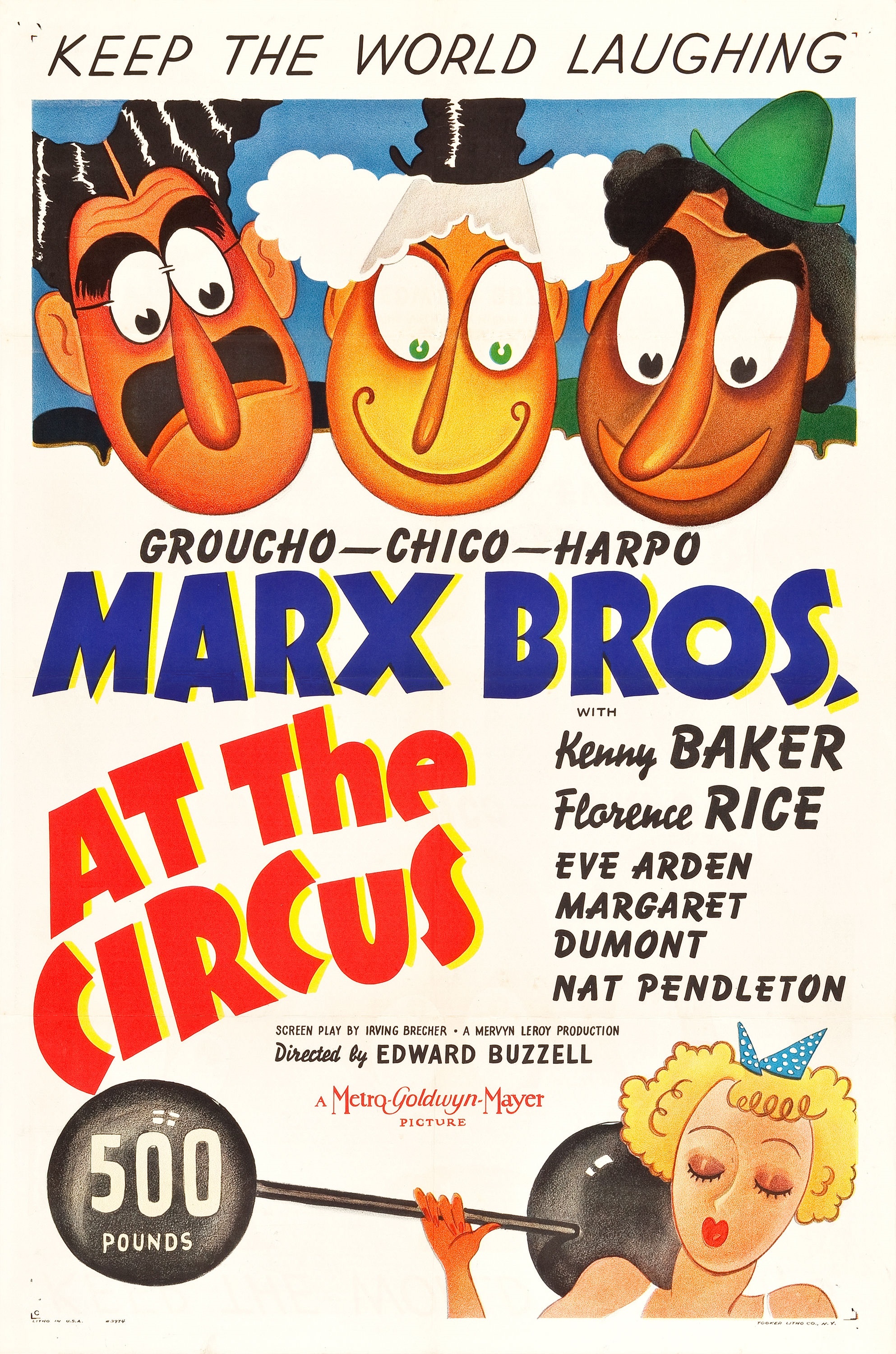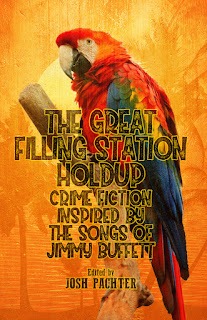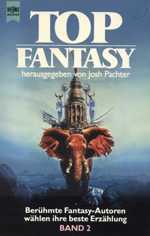 DUTCH TREAT
DUTCH TREATby Josh Pachter
Hebban, the largest online literary community in The Netherlands, recently asked its readers to nominate their favorite Dutch-language crime novels. Based on the results of that survey, they published a list of the ninety-nine best crime novels written in Dutch.
The list includes books by fifty-four different authors—forty-one men, twelve women, and one husband/wife collaboration. Most of the writers are Dutch, and a few are Flemish writing in Dutch (since only about two million people read the Flemish language but twenty-two million read Dutch). Five of the Dutch writers—Tomas Ross, Esther Verhoef, Peter de Zwaan, Charles den Tex, and René Appel—account for twenty-five of the ninety-nine books on the list.
Dutch-language crime novels are referred to in The Netherlands and Flanders as “thrillers,” although that term is used more generically there than it is here and includes the full range of crime fiction’s subgenres. Although the literature certainly includes what we would call police procedurals and even the traditional locked-room mystery, most Dutch-language crime fiction is psychological, examining the impact crime has on both those who commit it and those who are victimized by it.
 I lived in Amsterdam for several years during the 1980s and wound up fluent in the language, so I’ve read a considerable amount of Dutch crime fiction. There’s a lot of top-quality work out there, and I wish that more of it was available in English, so you Sayers of the Sleuth could enjoy it. Here’s a guided tour to some of what is available in translation, with purchase links:
I lived in Amsterdam for several years during the 1980s and wound up fluent in the language, so I’ve read a considerable amount of Dutch crime fiction. There’s a lot of top-quality work out there, and I wish that more of it was available in English, so you Sayers of the Sleuth could enjoy it. Here’s a guided tour to some of what is available in translation, with purchase links:
• The Dutch author with whom you’re probably most likely to already be familiar is Janwillen van de Wetering (1931-2008). Van de Wetering was for some years a police officer in Amsterdam, and he wrote a series of fifteen novels and a collection of short stories about two cops named Grijpstra and de Gier (in addition to three books about Hugh Pine, five standalones, and several volumes of nonfiction). Click here for links to his work now available on the ’Zon.
• The second most important Dutch crime writer in English translation was Robert van Gulik (1910-1967), whose seventeen Judge Dee mysteries are set in Seventh Century China and based on a real-life statesman/detective, Di Renjie. Click here for purchase links.
• When it comes to publication in English, Baantjer (1923-2010) was the most prolific. His full name was Albert Cornelis Baantjer, and he was one of a number of Dutch crime writers who published mononymically (including Havank and Ivans, among others). Like van de Wetering, Baantjer also served as an Amsterdam policeman, and thirty of his long series of novels featuring Inspector DeKok have been published in English. Here’s a link to those available on Amazon. (By the way, the character’s original name was De Cock, which isn’t as funny in Dutch as it would be in English, so the spelling was changed out of deference to US readers. From 1995 to 2006, there were a hundred and twenty-four episodes of a Dutch television series based on the character. Oddly, the series was titled Baantjer rather than De Cock.)
 • Under the pen name “Michael Berg,” Michel van Bergen Henegouwen (1956- ) has produced a number of excellent books about investigative journalist Chantal Zwart and several standalones. To date, only one volume of the Zwart series—Nightmare in Paris—has appeared in English, but it’s an exciting rollercoaster ride of a tale, as Chantal investigates the death of a famous politician … in the bed of one of her old school friends.
• Under the pen name “Michael Berg,” Michel van Bergen Henegouwen (1956- ) has produced a number of excellent books about investigative journalist Chantal Zwart and several standalones. To date, only one volume of the Zwart series—Nightmare in Paris—has appeared in English, but it’s an exciting rollercoaster ride of a tale, as Chantal investigates the death of a famous politician … in the bed of one of her old school friends.
• Esther Verhoef is one of only two authors to appear on the Hebban list six times, although that accomplishment probably needs an asterisk, since three of those six books were cowritten with her husband, Berry Verhoef, and published as by “Escober.” (ESther COllaborating with BERry, get it?) Only two of her novels have been published in English so far—Mother Dear and Close to the Cradle—and both of those were released under another pseudonym, Nova Lee Meier. (The other six-time Hebban Lister is Tomas Ross (1969- ), author of more than fifty novels, none of which has yet been published in English!)
 • Flemish author Bob Van Laerhoven (1953- ) has had some success in the US with his award-winning literary crime novels, including Baudelaire’s Revenge and The Shadow of the Mole. Van Laerhoven spent many years as a war correspondent, and his work—while often poetic—digs deeply into man’s inhumanity to man.
• Flemish author Bob Van Laerhoven (1953- ) has had some success in the US with his award-winning literary crime novels, including Baudelaire’s Revenge and The Shadow of the Mole. Van Laerhoven spent many years as a war correspondent, and his work—while often poetic—digs deeply into man’s inhumanity to man.
• Bram Dehouck (1978- ) is another Flemish writer. He’s only published five novels (and one volume of nonfiction), but his 2009 debut, De Minzame Mordenaar—which is one of the best crime novels I’ve ever read—remains the only book to date to have won both the Golden Noose for Best Dutch-Language Crime Novel of the Year and the Shadow Prize for Best First Dutch-Language Crime Novel. His sophomore novel, Sleepless Summer, also won the Golden Noose, and is so far his only full-length work in English. Its premise—and I wouldn’t call this a spoiler—is that the noise produced by a newly installed wind turbine drives some of the residents of a small Dutch town mad enough that they begin to behave violently.
• Hilde Vandermeeren (1970- ) is from Flanders, too. She began as a successful author of books for children, but then “graduated” to thrillers. The Scorpion’s Head is the first of her books to be published in English. Gaelle wakes up in a psychiatric hospital with no memory of the events that brought her there. Michael is a paid assassin on the run from his employers. Their paths cross in a book that crackles with suspense.
• With some reluctance, I should probably include Pieter Aspe (1953-2021) in this essay. Aspe was far and away the most successful Flemish crime writer to date: while a typical Flemish thriller might sell as many as fifteen hundred copies, Aspe at the height of his popularity was selling sixty thousand copies of each of his Inspector Van In procedurals (and a Dutch-language TV series named Aspe rather than Van In ran for a hundred and twenty-seven episodes from 2004 to 2014, just edging out Baantjer’s Baantjer). Why the reluctance? Well, when the first of Aspe’s forty Van In books was published in English in 2013 as The Square of Revenge, I was eager to read it—and revolted by the extremely poor quality of the translation. Three more entries in the series have subsequently appeared, and I’ll admit that I haven’t bothered to check them out. If you’re a glutton for punishment, you can get all four books for your Kindle for the bargain-basement price of $2.99 here.
 Speaking of translation, some readers of this website are aware that I have translated many short stories by Dutch and Flemish writers (including one by Aspe) into English. I’ll come back to short stories in a bit, but first let me mention one author of each nationality whose novels I’ve translated.
Speaking of translation, some readers of this website are aware that I have translated many short stories by Dutch and Flemish writers (including one by Aspe) into English. I’ll come back to short stories in a bit, but first let me mention one author of each nationality whose novels I’ve translated.
• René Appel (1945- ) is known as “the godfather of the Dutch psychological novel” and has written some two dozen standalones, including two Golden Noose winners. His first novel to appear in English was The Amsterdam Lawyer, which came out earlier this year. I’m obviously biased, but I think it’s one of René’s best, a closeup look at a hardworking attorney who slowly spirals into crime and madness.
 • And then there’s Bavo Dhooge (1973- ), a Flemish workaholic who since his debut in 2001 has published more than a hundred novels, including winners of the Shadow Prize, the Diamond Bullet, and the Hercule Poirot Prize. In 2015, Simon & Schuster released my translation of Styx, a cross-genre romp in which a corrupt homicide cop is murdered by a serial killer labeled “The Stuffer” by the news media … and then returns as a zombie to end the Stuffer’s reign of terror.
• And then there’s Bavo Dhooge (1973- ), a Flemish workaholic who since his debut in 2001 has published more than a hundred novels, including winners of the Shadow Prize, the Diamond Bullet, and the Hercule Poirot Prize. In 2015, Simon & Schuster released my translation of Styx, a cross-genre romp in which a corrupt homicide cop is murdered by a serial killer labeled “The Stuffer” by the news media … and then returns as a zombie to end the Stuffer’s reign of terror.
The book blends crime fiction, horror, science fiction, and fantasy, and although it got great reviews Simon & Schuster had no idea how to promote it. (If the Belgian Netflix miniseries currently in production winds up on American Netflix, perhaps the book will have a second chance at building a readership.) Last fall, a US edition of Dhooge’s Santa Monica, the first of ten standalones set in and around L.A., was published under the pseudonym “Bo Dodge.” (I didn’t find out about the pseudonym until it was too late to change it. It’s an unfortunate choice, I think, since it suggests that the book is a Western, which it isn’t. It’s an Elmore-Leonardesque caper story about a female burglar, the bouncer who falls for her, and the televangelist they set out to rip off.)
Okay, let’s move on as promised to short fiction.
Ellery Queen’s Mystery Magazine published a number of Janwillem van de Wetering’s short stories during the 1980s. Once Janwillem hit it big with American readers, he moved to Maine and began to write his novels in English, translating them back into Dutch himself. For some reason, he reversed that pattern with his short stories, writing them in Dutch and translating them himself (with two exceptions, which I was asked to translate) into English. One of the ones I translated, “There Goes Ravelaar!,” was a finalist for the Best Short Story Edgar in 1986.
In 2002, current EQMM editor Janet Hutchings introduced a regular feature called “Passport to Crime” to the magazine’s readers, with one translated story appearing in every issue, and she asked me to find and translate work by Dutch (and, later, Flemish) writers. Over the last twenty years, I’ve provided about two dozen Dutch and Flemish crime stories to EQMM. If you have access to back issues of the magazine, you can click here and scroll down past the testimonials to a bibliography of all of my translations, including but not limited to my “Passport” stories.
You can also find fourteen stories by Dutch crime writers collected in
Amsterdam Noir, a volume in Akashic Books’ excellent “City Noir” series. René Appel and I co-edited the book and co-wrote one of the stories, and I translated twelve of them. Each story is set in a different part of the city, and several are—as per Akashic’s model for the series—by professional writers who hadn’t previously tried their hands at crime fiction.
If you’re interested in reading crime novels about The Netherlands but not necessarily written by Dutch authors, you can’t go wrong with the ten-book Van der Valk series by British writer Nicholas Freeling (1927-2003). Piet van der Valk is—like van de Wetering’s Grijpstra and de Gier and Baantjer’s DeKok—an Amsterdam cop. Also like DeKok (and Aspe’s Van In), his adventures wound up on television—though in this case it was a British series, filmed in English but set in The Netherlands, that ran more seasons than Freeling wrote books about the character, with Barry Foster playing the inspector. A remake starring Marc Warren as a younger van der Valk began in 2020, and both versions can be watched on Amazon Prime.
(By the way, in “case” you’re wondering whether it’s the lower-case v in “van de Wetering” and “van der Valk” or the upper-case V in “Van In” that’s the typo, the answer is: neither. The Dutch use the lower-case, except at the beginning of a sentence, while the Flemish use the upper-case. Ya learn something new every day here at Sleuthsayers, dontcha?...)
Finally, if I can get away with a paragraph of BSP, there’s Dutch T(h)reat, my own first novel, coming from Genius Books this fall. An American graduate student is sent to Amsterdam to conduct historical research for one of his professors in the Begijnhof, a closed community whose residents are all elderly women. As the ladies begin to die, an attractive young nurse is the prime suspect, and the American joins forces with her to track down the real killer in order to clear the nurse of suspicion.
If you haven’t yet dipped your toes into the waters of Dutch-language crime-fiction, I hope this overview will encourage you to do so. Much reading pleasure awaits you! Geniet ervan!



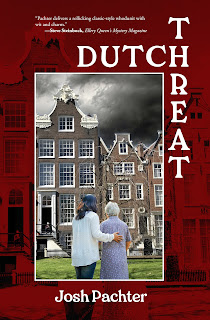 In my book, American graduate student Jack Farmer is sent to The Netherlands to do historical research in the Begijnhof and is granted special permission to move into Het Houten Huys (“The Wooden House”) for the two weeks of his stay. He finds himself—if you’ll forgive an old-fashioned word—smitten with Jet Schilders, the young nurse who checks in regularly on several of the elderly residents … and when one of them is murdered and Jet turns out to be a suspect, Jack teams up with her to investigate the killing and clear her name.
In my book, American graduate student Jack Farmer is sent to The Netherlands to do historical research in the Begijnhof and is granted special permission to move into Het Houten Huys (“The Wooden House”) for the two weeks of his stay. He finds himself—if you’ll forgive an old-fashioned word—smitten with Jet Schilders, the young nurse who checks in regularly on several of the elderly residents … and when one of them is murdered and Jet turns out to be a suspect, Jack teams up with her to investigate the killing and clear her name. 













